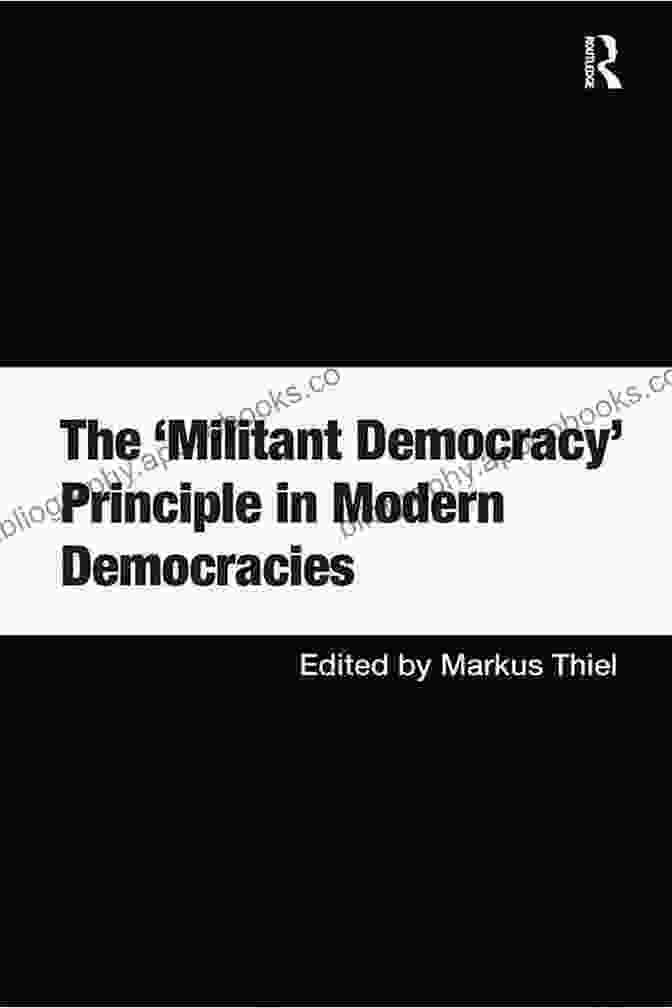The Militant Democracy Principle: A Cornerstone of Modern Democracies


In the annals of democratic governance, the concept of militant democracy has emerged as a pivotal principle that underpins the stability and resilience of modern democracies. This principle acknowledges the inherent tension between the preservation of democratic values and the need to safeguard those values from internal and external threats. In this comprehensive article, we delve into the intricate workings of the militant democracy principle, examining its historical origins, key components, and contemporary applications within the framework of modern democracies.
4.8 out of 5
| Language | : | English |
| File size | : | 9950 KB |
| Text-to-Speech | : | Enabled |
| Screen Reader | : | Supported |
| Enhanced typesetting | : | Enabled |
| Word Wise | : | Enabled |
| Print length | : | 439 pages |
Historical Foundation
The genesis of the militant democracy principle can be traced back to the writings of classical Athenian philosophers such as Plato and Aristotle. They argued that a well-functioning democracy required not only the participation of its citizens but also the willingness to defend it against potential threats. This included both internal challenges, such as tyranny or demagoguery, and external threats, such as invasion or subversion.
In the modern era, the militant democracy principle gained renewed attention during the rise of fascism and communism in the 20th century. Faced with the threat of totalitarian ideologies, democratic societies recognized the need to develop robust mechanisms to protect their cherished values. The writings of Carl Schmitt and Hannah Arendt, among others, further elaborated on the concept, emphasizing the importance of a "militant citizenry" that is actively engaged in defending democratic institutions.
Key Components
The militant democracy principle is based on several key components:
- Citizen Participation: The foundation of any militant democracy lies in the active participation of its citizens. This involves not only voting and holding office but also engaging in civic discourse, monitoring government actions, and organizing for change. Democratic institutions are only as strong as the citizens who support and defend them.
- Institutional Resilience: Modern democracies have developed a range of institutional mechanisms to protect their democratic systems from threats. These mechanisms include independent judiciaries, constitutional safeguards, and checks and balances between different branches of government. They ensure that no single individual or entity can accumulate excessive power and undermine democratic principles.
- Rule of Law: The rule of law forms the bedrock of any militant democracy. It ensures that all citizens, including those in power, are subject to the same laws and that there is no impunity for those who violate those laws. A robust rule of law system provides essential protection against arbitrary or oppressive actions that could erode democratic norms.
- Democratic Education: The long-term sustainability of militant democracy hinges on the education of its citizens. Civic education helps individuals understand the principles of democracy, the importance of civic engagement, and the skills necessary to defend democratic institutions from threats. By fostering an informed and engaged citizenry, democracies can ensure the future generation's commitment to democratic values.
Contemporary Applications
The militant democracy principle continues to play a vital role in modern democracies around the world. Here are some examples of its application:
- Combating Extremism: Militant democracies have adopted a range of measures to combat extremism and terrorism. These include surveillance and intelligence gathering, law enforcement, and deradicalization programs. Democratic societies must vigilantly protect their citizens from violent extremism while upholding fundamental rights and freedoms.
- Protecting Free Speech: Freedom of expression is a cornerstone of democracy, but it also comes with responsibilities. Militant democracies must balance the right to free speech with the need to prevent hate speech or incitement to violence that could undermine social cohesion and democratic values.
- Resisting Foreign Interference: External threats to democracy can come in various forms, including espionage, propaganda, and political interference. Militant democracies employ counterintelligence, diplomacy, and international cooperation to protect their sovereignty and democratic processes from external manipulation.
- Combating Corruption: Corruption undermines public trust and weakens democratic institutions. Modern democracies have established anti-corruption agencies, whistleblower protection laws, and ethics regulations to combat corruption and ensure the integrity of their political systems.
Challenges and the Way Forward
Despite its importance, the militant democracy principle faces challenges that modern democracies must address to ensure its continued vitality:
- Political Polarization: Excessive political polarization can lead to gridlock, distrust, and a weakening of democratic institutions. Finding ways to bridge political divides and foster constructive dialogue is essential for the health of militant democracy.
- Technological Advancements: Social media and other technologies have become double-edged swords for democracy. While they can facilitate civic engagement, they can also spread misinformation and polarize public opinion. Militant democracies must navigate the complexities of technology to harness its potential while mitigating its risks.
- Economic Inequality: Persistent economic inequality can create social unrest and erode trust in democratic systems. Addressing economic disparities and promoting social justice is crucial for maintaining democratic legitimacy.
- Erosion of Trust: Public trust in democratic institutions has been declining in recent years. Rebuilding trust requires transparency, accountability, and a commitment to responsive and effective governance.
The militant democracy principle is an indispensable cornerstone of modern democracies. By embracing citizen participation, institutional resilience, the rule of law, and democratic education, democratic societies can safeguard their values against internal and external threats. While challenges remain, a commitment to the militant democracy principle is essential for preserving the integrity and vitality of democratic governance for generations to come. Only by actively defending democracy can we ensure that it remains a beacon of hope and a guiding force for societies around the world.
4.8 out of 5
| Language | : | English |
| File size | : | 9950 KB |
| Text-to-Speech | : | Enabled |
| Screen Reader | : | Supported |
| Enhanced typesetting | : | Enabled |
| Word Wise | : | Enabled |
| Print length | : | 439 pages |
Do you want to contribute by writing guest posts on this blog?
Please contact us and send us a resume of previous articles that you have written.
 Book
Book Novel
Novel Page
Page Chapter
Chapter Text
Text Story
Story Genre
Genre Reader
Reader Library
Library Paperback
Paperback E-book
E-book Magazine
Magazine Newspaper
Newspaper Paragraph
Paragraph Sentence
Sentence Bookmark
Bookmark Shelf
Shelf Glossary
Glossary Bibliography
Bibliography Foreword
Foreword Preface
Preface Synopsis
Synopsis Annotation
Annotation Footnote
Footnote Manuscript
Manuscript Scroll
Scroll Codex
Codex Tome
Tome Bestseller
Bestseller Classics
Classics Library card
Library card Narrative
Narrative Biography
Biography Autobiography
Autobiography Memoir
Memoir Reference
Reference Encyclopedia
Encyclopedia Veronia Wilson
Veronia Wilson Deborah T Goldberg
Deborah T Goldberg Rachel Zucker
Rachel Zucker Tony Moss
Tony Moss Joseph M Siracusa
Joseph M Siracusa Jim Cusack
Jim Cusack Carrie Chapman Catt
Carrie Chapman Catt Mrs Autumn Mckay
Mrs Autumn Mckay Fiona Grace
Fiona Grace P M Sabin Moore
P M Sabin Moore Greg Maxwell
Greg Maxwell Pharm Ibrahim
Pharm Ibrahim James Boggs
James Boggs Marc Askew
Marc Askew Justin Travis Call
Justin Travis Call Peter D Mcdonald
Peter D Mcdonald Jeremy Langley
Jeremy Langley Nicole Forsgren Phd
Nicole Forsgren Phd David Rosenfelt
David Rosenfelt Winifred Holtby
Winifred Holtby
Light bulbAdvertise smarter! Our strategic ad space ensures maximum exposure. Reserve your spot today!

 Allen GinsbergUnlock the Power of Small Groups: Making the Most of This Transformative...
Allen GinsbergUnlock the Power of Small Groups: Making the Most of This Transformative...
 Denzel HayesGroovy Little Hippie Pad: Terri Hooley's Belfast Adventure | A Love Letter to...
Denzel HayesGroovy Little Hippie Pad: Terri Hooley's Belfast Adventure | A Love Letter to... Darrell PowellFollow ·12.8k
Darrell PowellFollow ·12.8k Forrest ReedFollow ·20k
Forrest ReedFollow ·20k James GrayFollow ·14.6k
James GrayFollow ·14.6k Henry Wadsworth LongfellowFollow ·4.1k
Henry Wadsworth LongfellowFollow ·4.1k Vince HayesFollow ·19.3k
Vince HayesFollow ·19.3k Samuel BeckettFollow ·5.2k
Samuel BeckettFollow ·5.2k Colin RichardsonFollow ·6.7k
Colin RichardsonFollow ·6.7k David BaldacciFollow ·14k
David BaldacciFollow ·14k

 Finn Cox
Finn CoxEmpowering School-Based Professionals: A Comprehensive...
: The Role of School-Based Professionals in...

 F. Scott Fitzgerald
F. Scott FitzgeraldThe Santa Fe Trail Twentieth Century Excursion: A...
Get ready to embark on an...

 Kendall Ward
Kendall WardThe Ultimate Trivia Guide to Bruce Springsteen and the...
Bruce Springsteen...

 Jedidiah Hayes
Jedidiah HayesThe Trouble with Lacy Brown: Texas Matchmakers - A...
Prepare to be swept...
4.8 out of 5
| Language | : | English |
| File size | : | 9950 KB |
| Text-to-Speech | : | Enabled |
| Screen Reader | : | Supported |
| Enhanced typesetting | : | Enabled |
| Word Wise | : | Enabled |
| Print length | : | 439 pages |












